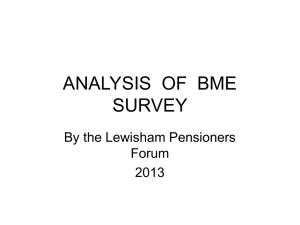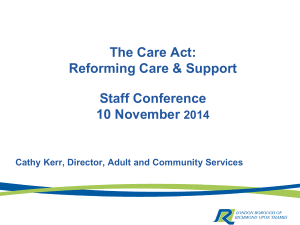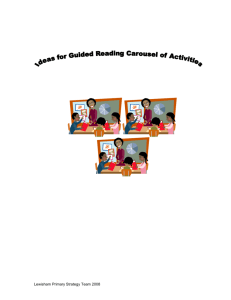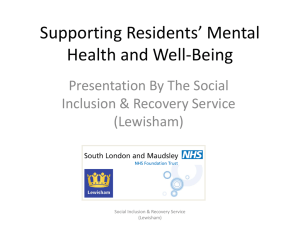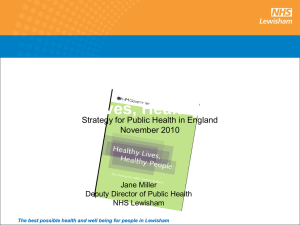What we are trying to Achieve
advertisement
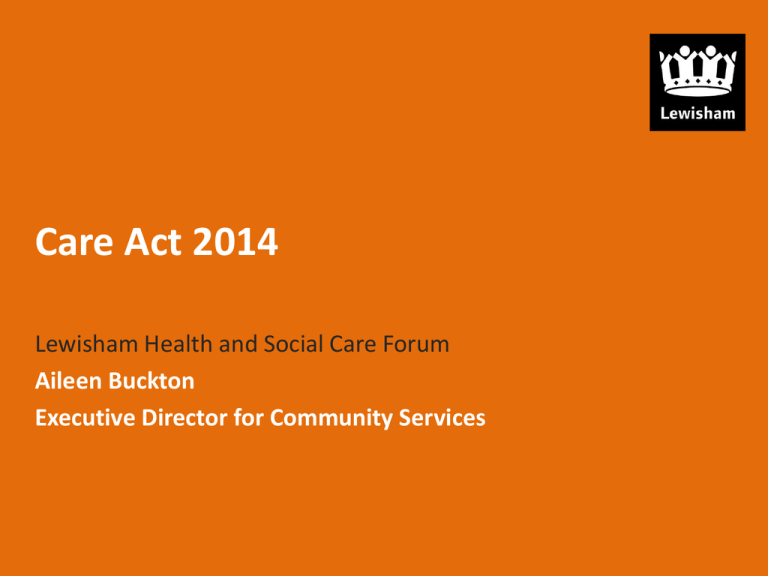
Care Act 2014 Lewisham Health and Social Care Forum Aileen Buckton Executive Director for Community Services Context for change: demands on the system Care and support affects a large number of people In England there …around are… 1.1 million Supported people receiving care at home, 80% of whom are statesupported Supported …around 400,000 people in residential care, 56% of whom are state-supported …1.5 million people employed in the care and support workforce …and around 6 million people caring for a friend or family member. Three-quarters of people aged 65 will need care and support in their later years 19 per cent of men and 34 per cent of women will need residential care 48 per cent of men and 51 per cent of women will need domiciliary care only 33 per cent of men and 15 per cent of women will never need formal care The Care Act: reforming care and support Older people are the core user of acute hospital care - 60% of admissions, 65% of bed days and 70% of emergency readmissions. 72% of recipients of social care services are older people, accounting for 56% of expenditure on adult social care. Lewisham Council Financial Context Council £95m from £285m = 33%... Adults £25m from £80m (or £100m gross) This year £7.2m (-£3m) Next year £6.6m National Model of Adult Social Care People’s care and support needs will be met by: 1. Harnessing capacity within neighbourhoods and families 2. Prevention of needs escalating (e.g. Enablement) 3. Personalised, quality support to meet care needs Approach in Lewisham WE WILL SET OUT A LOCAL ‘APPROACH’ FOR LEWISHAM • Community based: drawing on people’s personal, social and community strengths • Fair across client groups • Integrated • Affordable • Consistent • Caring For Context.... This is primary legislation to be repealed, in whole or in part: • • • • • • • • • • • • • National Assistance Act 1948 Health Services and Public Health Act 1968 Local Authority Social Services Act 1970 Chronically Sick and Disabled Persons Act 1970 Health and Social Services and Social Security Adjudications Act 1983 Disabled Persons (Services, Consultation and Representation) Act 1986 National Health Service and Community Care Act 1990 Carers (Recognition and Services) Act 1995 Carers and Disabled Children Act 2000 Health and Social Care Act 2001 Community Care (Delayed Discharges etc.) Act 2003 Carers (Equal Opportunities) Act 2004 National Health Service Act 2006 What could it mean for Lewisham? Assessment and Support Planning... • • • • • Emphasis on helping people find solutions “Meeting needs” not “providing services” Gradual reviewing – not a big bang New national eligibility criteria Rights to personal budgets What could it mean for Lewisham? Carers... • • • • • Focus on advice and prevention New national eligibility criteria Rights to personal budgets Young carer protocols Respite [“replacement”] care not a carer service What could it mean for Lewisham? Financial contributions... • Care costs ‘capped’ (April 2016) • Care Accounts to track progress • Council has to arrange services for selffunders if asked (but we can charge) • We plan to consult on changes to the local policy in time for April 2015 What could it mean for Lewisham? Wider Voluntary Sector... • Social care changes in April – Staff knowledge – Up to date resources and information • Growth in personal budgets = opportunity? • Growth in demand = challenge? – People seeking advice or preventative support – People with more complex needs looking for equal access to community – Self-funders; hidden carers What happens next? 1. Deciding on models that need to change, e.g. Advice and Information model 2. National & Local communications campaign 3. Consultations if required 4. New processes for support and care planning 5. Retraining staff Contacts • http://careandsupportregs.dh.gov.uk/ • NCVO, VAL, Carers UK, Age UK etc • Project Manager: tim.miller@lewisham.gov.uk • Your Commissioner / funders




